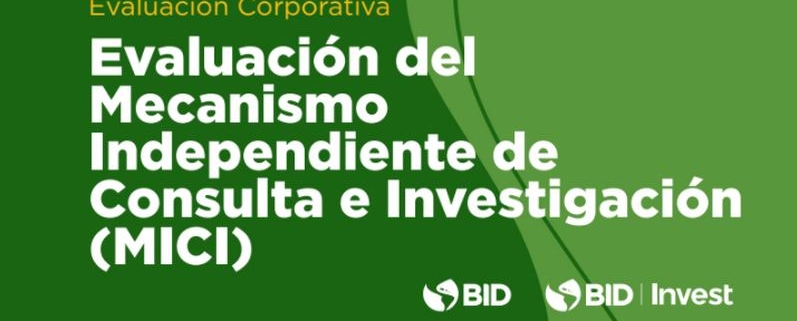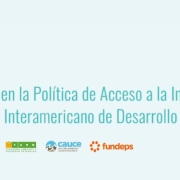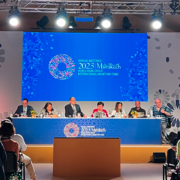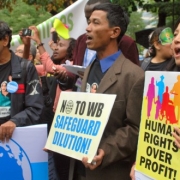Internal IDB evaluation raises the need for reforms in the operation of the MICI
On April 1, the Office of Evaluation and Oversight (OVE) presented an evaluation report of the Independent Consultation and Investigation Mechanism (MICI) corresponding to the period 2015-2020. The evaluation examined the Mechanism’s policy and its application, with the aim of informing the Boards of the IDB and IDB Invest on the extent to which the MICI has been an effective and efficient mechanism in the resolution of claims associated with environmental and social impacts of projects financed by the Bank.
“Below, we offer a google translate version of the original article in Spanish. This translation may not be accurate but serves as a general presentation of the article. For more accurate information, please switch to the Spanish version of the website. In addition, feel free to directly contact in English the person mentioned at the bottom of this article with regards to this topic”
In its report, the Office of Evaluation and Oversight (OVE) determined that the current MICI policy corrected important issues identified in its last evaluation of 2012. Among the main advances, it highlighted the solution to the problems of accountability and associated conflicts of interest. to the previous organizational structure, as well as the duplication problems of the eligibility instance; the establishment of deadlines for the management of requests; and the creation of instances for the participation of the administration. Likewise, he highlighted a greater consistency between the policy, the guidelines developed, and the associated processes.
The evaluation also highlighted the progress made in the internal functioning of the MICI, as a result of the restructuring of the mechanism, as well as the process of consolidation and institutional learning. The mechanism has been able to define its work plan and manage its human and budgetary resources independently of the IDB Group administration.
However, judicial exclusion, a key issue, remained pending. It is one of the exceptions of the internal policy to the eligibility of applications and establishes that those matters raised in an application that are being the subject of arbitration or judicial processes in a member country of the IDB Group are not eligible.
Although judicial exclusion was identified by OVE in 2012 as a limiting factor for the effective and independent functioning of the MICI, it was maintained in the reformulated policy in 2014. Likewise, there are other limitations that have emerged in the application of the policy in recent years. 5 years but that, to a large extent, have been paid for by the MICI. This shows that there is sufficient margin for the mechanism to manage the limitations of the current policy.
Access to the MICI
Regarding access to the mechanism, OVE identified that the MICI is not yet well known among applicants. Realizing that between the different institutional levels there is a lack of consensus on the importance of publicizing the mechanism and the way to achieve it. An issue that should not be overlooked, since access to the MICI depends on the knowledge that people have about the existence of the mechanism.
For their part, those who were able to access the MICI found that their applications were not registered due to the difficulty in complying with some requirements. In this regard, the IDB Group does not have a claims management system, which makes it impossible to know the number of concerns that the administration receives.
Case management
Regarding case management, although the MICI is operating in accordance with the principles established in its policy: independence, objectivity, impartiality, transparency and efficiency; Their ability to act independently is affected by being subject to the decisions of the Board of Executive Directors.
In accordance with its policy, the Board controls the possibility of initiating an investigation in the Compliance Verification Phase (FVO) and decides whether or not to approve the recommendations of an MICI investigation. Originally, the approval of the Board of Directors to continue with an investigation was thought as a short procedure but it has come to be conformed as a contentious procedure affecting the independence of the MICI.
Finally, many ongoing investigations have presented delays related to the complexity of the projects and themes. Complaints were also filed by the applicants about the length and slowness of the processes in the Compliance Verification Phase (FVO), which reduces the possibilities of effective redress.
Recommendations
After identifying the main difficulties in the current operation of the mechanism, OVE proposed a series of recommendations to be adopted by the MICI. Among the main ones, in the first place, the elimination of judicial exclusion and the strengthening of its internal capacities stand out. In turn, OVE highlighted the need to reinforce the independence of the mechanism and ensure the adoption of corrective measures when there are findings of non-compliance with the policies and related damages.
Remembering that one of the main objectives of the IDB Group is to improve the quality of life in the region, monitoring its policy is a key tool to guarantee compliance with socio-environmental safeguards and transparency in the development of projects. funded. If the recommendations made by OVE are applied, it would imply a declaration of commitment by MICI to the users, who, among other complaints, have systematically insisted on an improvement in the conditions for accessing the mechanism.
Based on this evaluation, one might wonder if the limitations of the current policy can be rectified by incorporating OVE’s recommendations or if these limitations, on the contrary, make a new comprehensive review of the policy necessary, a measure that has been ruled out by OVE until the moment.
At Fundeps, we consider that there are still many obstacles to overcome to guarantee an effective and independent action of the mechanism, especially regarding the need to nullify judicial exclusion. However, we highlight the importance of these types of entities that are beneficial for both the public and private sectors, and especially for the communities affected by IDB Group investments.
More information:
- Evaluation of the Independent Consultation and Investigation Mechanism (MICI) – Office of Evaluation and Oversight (OVE)
- MICI Response to the Evaluation – MICI
- We participated in a discussion with the new MICI director, Andrea Repetto – Fundeps (2021)
Authors:
Clara Labat
Julieta Boretti
Contact:
Gonzalo Roza, gon.roza@fundeps.org







